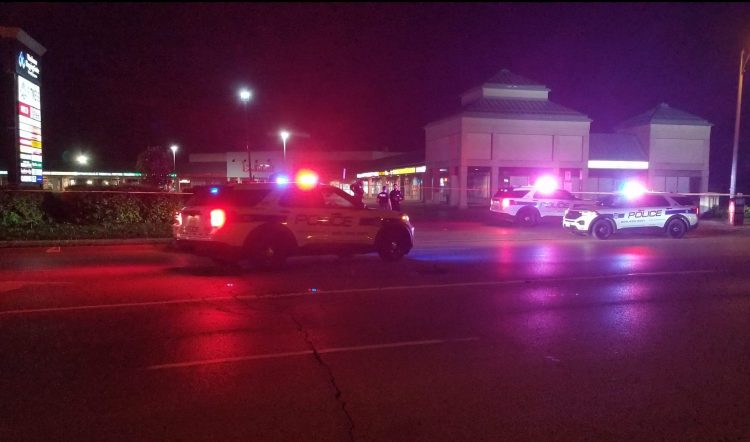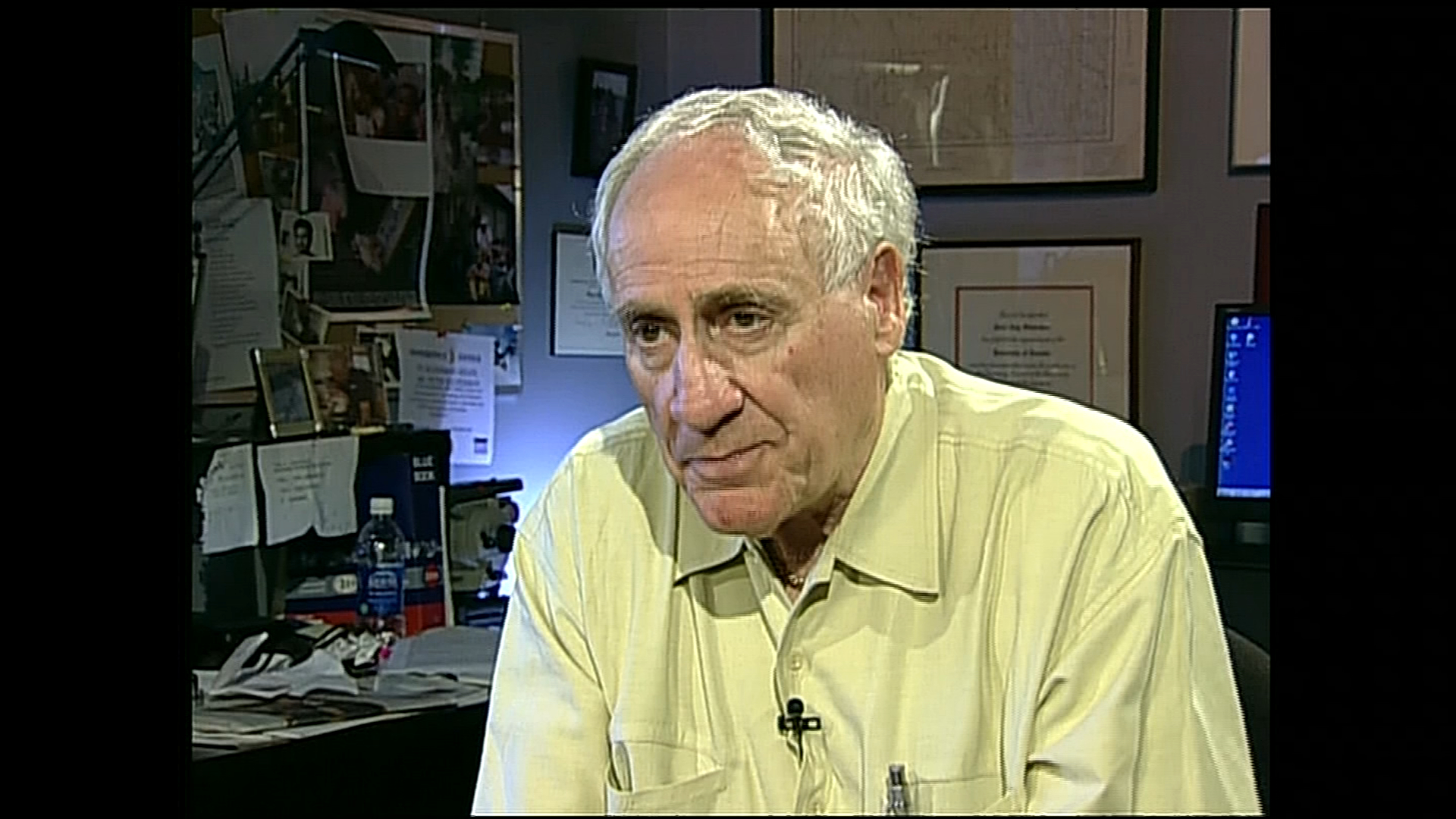A man has been killed in an early morning shooting in Brampton Monday.
Peel police were called to Dixie Road and Peter Roberton Boulevard just before 1 a.m. to reports of a shooting.
The male victim was found on the scene and rushed to Sunnybrook Hospital in life-threatening condition. He died of his injuries in hospital.
Police say a suspect fled the area in a red vehicle, but no further details have been released.
The homicide unit has taken over the investigation.
The eastbound lanes of Peter Roberton Blvd. are closed between Dixie and Softneedle Avenue.

Peel police are investigating a deadly collision between a motorcycle and a car in Brampton.
Police said they were called at around 6 p.m. Monday to the Westbrook Avenue and Cottrelle Boulevard area for a report of a collision.
Investigators said a 21-year-old motorcycle rider died of his injuries in hospital.
The occupants of the second vehicle did not suffer any physical injuries, police said.
No other information has been released at this time.
Anyone with information is asked to contact the police directly. Tips can also be left anonymously with Crime Stoppers.

Toronto Public Health (TPH) has closed an Etobicoke high school to in-person learning due to an outbreak of COVID-19.
Silverthorn Collegiate Institute, located at 291 Mill Road, had to be closed to protect students and staff, TPH said.
“COVID-19 activity in the school setting is not unexpected, given that the virus continues to circulate in Toronto and how transmissible Delta variant is,” TPH said in a news release Monday night. “This is why TPH continues to remind all residents to get vaccinated as soon as possible if they have not already done so.”
The agency said the new cases were reported over the weekend and there may have been exposure at “multi-grade events.”
The Toronto District School Board said Monday night that all students will move to remote learning for now.
“We’re working closely with Toronto Public Health and helping in any way we can. While we hope students can return to in-person learning shortly, it’s not yet clear how long the dismissal will last as that will depend on the TPH investigation,” said Ryan Bird, spokesperson for the board. “In the meantime, all students will be moving to remote learning.”
TPH said there are 21 active school outbreaks and 30 active investigations in 122 schools.
They added this is its first whole-school dismissal of the academic year.
Files from the Canadian Press were used in this report

Toronto police say a motorcyclist is in life-threatening condition following a collision with another vehicle Monday evening.
Police said they were called to Lake Shore Boulevard and British Columbia Road for a report of a collision.
The motorcycle rider has been transported to the hospital, police said.
Toronto Paramedic Services said the driver of the vehicle was taken to the hospital with minor injuries.
No other information has been released by the police at this time.
Anyone with information is asked to contact the police directly. Tips can also be left anonymously with Crime Stoppers.
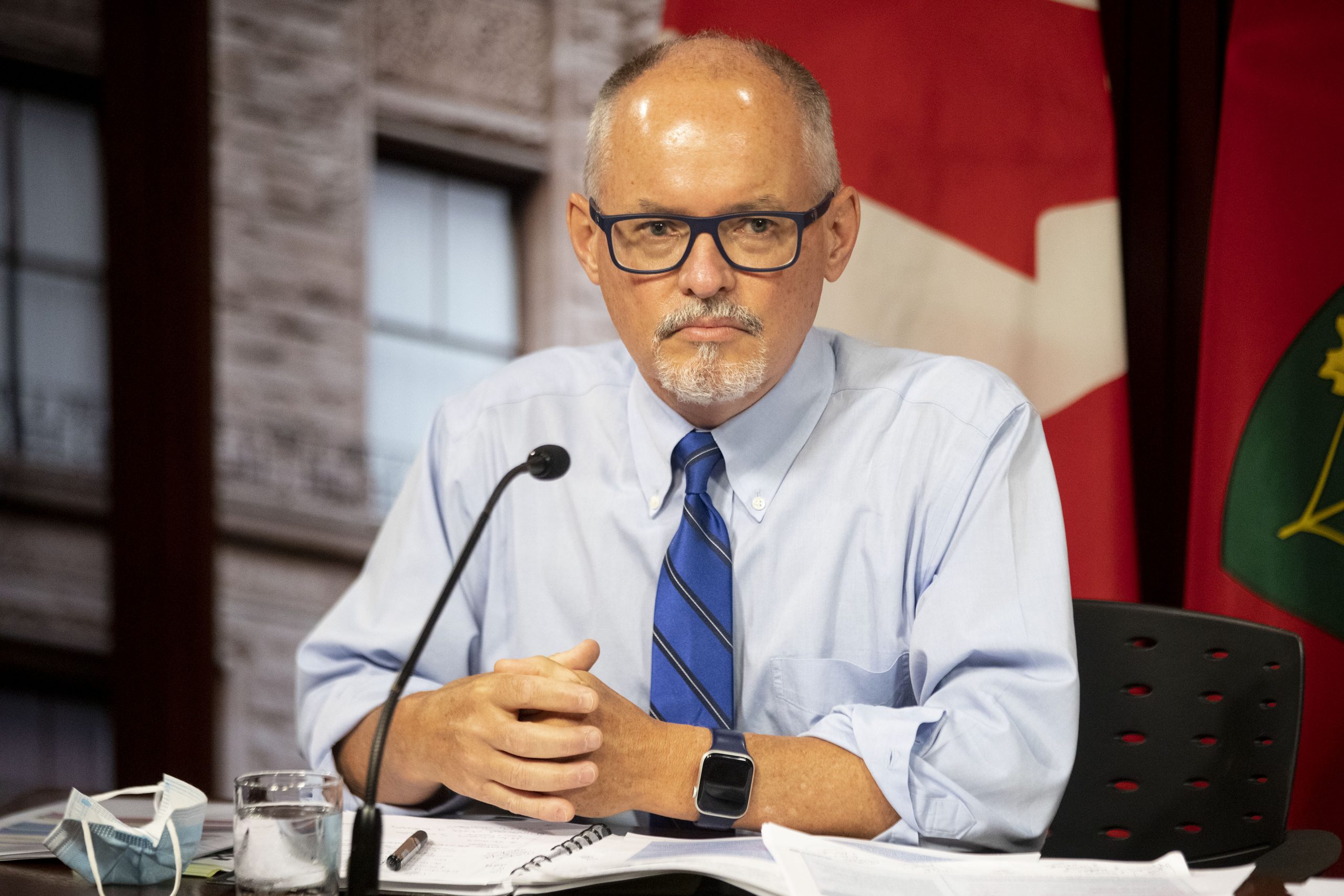
Summary
Dr. Kieran Moore says celebrating indoors and unmasked with a fully vaccinated group is “absolutely appropriate”
Ontario’s gathering limits of 100 outdoors and 25 indoors are still in place
Province’s average of daily new COVID-19 cases has generally been declining since early September
Ontario’s Chief Medical Officer of Health Dr. Kieran Moore has released his guidelines for safely celebrating Thanksgiving and Halloween.
For the Thanksgiving weekend ahead, Moore said it is safe to have a gathering with people you don’t live with, as long as you keep within the gathering limits of 25 indoors and 100 outdoors and follow all public health measures.
He also said if all the people attending the event are vaccinated, it is safe to remove face coverings.
Here are some of the other health measures he recommends if you are hosting an in-person gathering:
- clean and disinfect high-touch surfaces;
- ask guests not to attend if they have symptoms, even if they are mild;
- make a list of guests attending in case your local public health unit needs it for contact tracing;
- have the fewest number of people possible at your gathering;
- use outdoor spaces whenever possible
Moore says if there is a combination of vaccinated and unvaccinated people in the group, attendees may consider keeping masks on indoors, particularly for older people or those with chronic medical conditions.
For Halloween, Dr. Moore recommends kids trick-or-treat outside as much as possible, be creative in including a face covering in your costume and stay home if you are experiencing any symptoms.
Some other recommendations if you plan on giving out treats include:
- Keep interactions with trick-or-treaters short and encourage them to move along after receiving their treat from you;
- Consider wearing a face covering when physical distancing cannot be maintained;
- Consider including the face covering as part of your costume if you are dressing up;
- Give out only purchased and packaged treats;
- Do not ask trick-or-treaters to sing or shout for their treats;
- Clean your hands often throughout the evening using soap and water or with hand sanitizer.
Last year, Ontario recommended that kids in the four COVID-19 hot spots, which were Toronto, Ottawa, Peel and York Regions at the time, should not go trick-or-treating.
For Remembrance Day, if you are attending a memorial event, do not attend if you are experiencing symptoms and wear a mask if physical distancing cannot be maintained.
More details on celebrating all three events over the next month can be found on the Ontario website.
Ontario’s average of daily new COVID-19 cases — at 576 — has generally been declining since early September, while last year at this time it was a bit higher, but on the rise.
Moore noted today a number of recent outbreaks have been associated with weddings, and he notes that next week proof of vaccination will be required to attend weddings and funerals in meeting and event spaces.
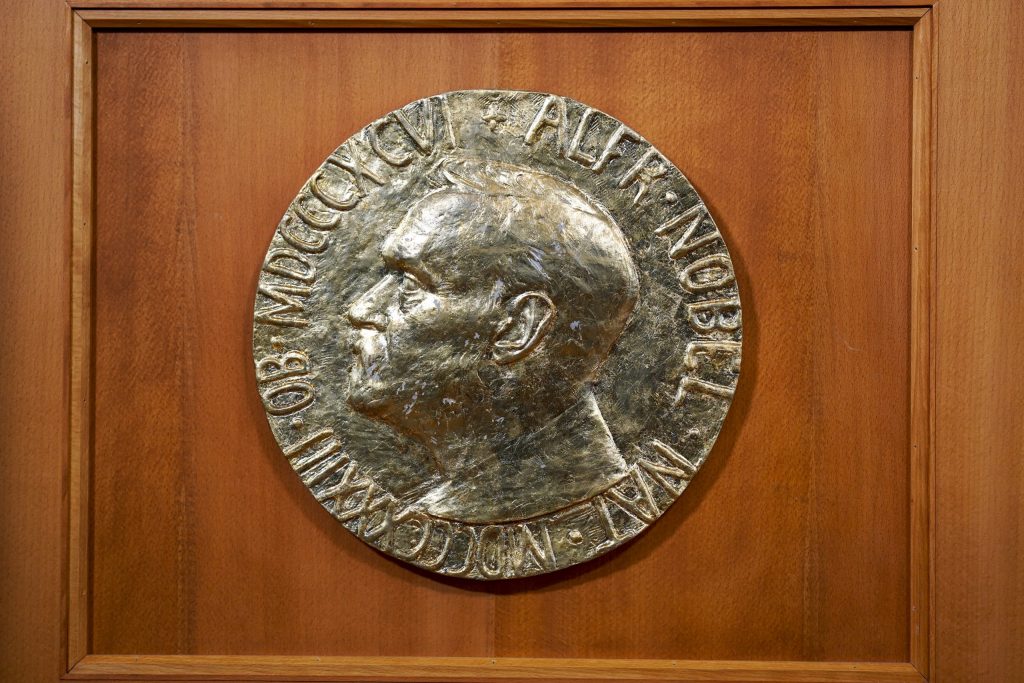
Summary
The Norwegian Nobel Committee cited their fight for freedom of expression, stressing that it is vital in promoting peace
The prestigious award is accompanied by a gold medal and 10 million Swedish kronor (over $1.14 million)
Still to come Monday is the prize for outstanding work in the field economics
The 2021 Nobel Peace Prize was awarded Friday to journalists Maria Ressa of the Philippines and Dmitry Muratov of Russia.
The Norwegian Nobel Committee cited their fight for freedom of expression, stressing that it is vital in promoting peace.
“Free, independent and fact-based journalism serves to protect against abuse of power, lies and war propaganda,” said Berit Reiss-Andersen, chair of the committee.
“Without freedom of expression and freedom of the press, it will be difficult to successfully promote fraternity between nations, disarmament and a better world order to succeed in our time,” she said.
Ressa in 2012 co-founded Rappler, a news website that has focused “critical attention on the (President Rodrigo) Duterte regime’s controversial, murderous anti-drug campaign,” the Nobel committee said.
She and Rappler “have also documented how social media is being used to spread fake news, harass opponents and manipulate public discourse.”
Reacting to the news, Ressa told Norway’s TV2 channel that “the government (of the Philippines) will obviously not be happy.”
“I’m a little shocked. It’s really emotional,” she added. “But I am happy on behalf of my team and would like to thank the Nobel Committee for recognizing what we are going through.”
Muratov was one of the founders of the independent Russian newspaper Novaya Gazeta in 1993.
“Novaya Gazeta is the most independent newspaper in Russia today, with a fundamentally critical attitude towards power,” the Nobel committee said.
“The newspaper’s fact-based journalism and professional integrity have made it an important source of information on censurable aspects of Russian society rarely mentioned by other media,” it added.
The Nobel committee noted that since the launch of Novaya Gazeta, six of its journalists have been killed, among them Anna Politkovskaya who covered Russia’s bloody conflict in Chechnya.
Kremlin spokesman Dmitry Peskov hailed Muratov as a “talented and brave” person.
“We can congratulate Dmitry Muratov — he has consistently worked in accordance with his ideals,” Peskov said in a conference call with reporters after the prize was announced.
Reiss-Andersen noted that the peace prize has gone to journalists in the past, including Ernesto Teodoro Moneta of Italy who was cited in 1907 “for his work in the press and in peace meetings.”
In 1935, Carl von Ossietzky was awarded the prize “his burning love for freedom of thought and expression” after revealing that Germany was secretly re-arming after World War I.
Reiss-Andersen also noted the risks to free speech in today’s world due to the spread of fake news, noting that Ressa has been critical of Facebook’s role in manipulating public debate. “Conveying fake news and information that is propaganda and untrue is also a violation of freedom of expression, and all freedom of expression has its limitations. That is also a very important factor in this debate,” she said.
The prestigious award is accompanied by a gold medal and 10 million Swedish kronor (over $1.14 million). The prize money comes from a bequest left by the prize’s creator, Swedish inventor Alfred Nobel, who died in 1895.
On Monday, the Nobel Committee awarded the prize in physiology or medicine to Americans David Julius and Ardem Patapoutian for their discoveries into how the human body perceives temperature and touch.
The Nobel Prize in physics was awarded Tuesday to three scientists whose work found order in seeming disorder, helping to explain and predict complex forces of nature, including expanding our understanding of climate change.
Benjamin List and David W.C. MacMillan were named as laureates of the Nobel Prize for chemistry Wednesday for finding an easier and environmentally cleaner way to build molecules that can be used to make compounds, including medicines and pesticides.
The Nobel Prize for literature was awarded Thursday to U.K.-based Tanzanian writer Abdulrazak Gurnah, who was recognized for his “uncompromising and compassionate penetration of the effects of colonialism and the fate of the refugee.”
Still to come Monday is the prize for outstanding work in the field economics.
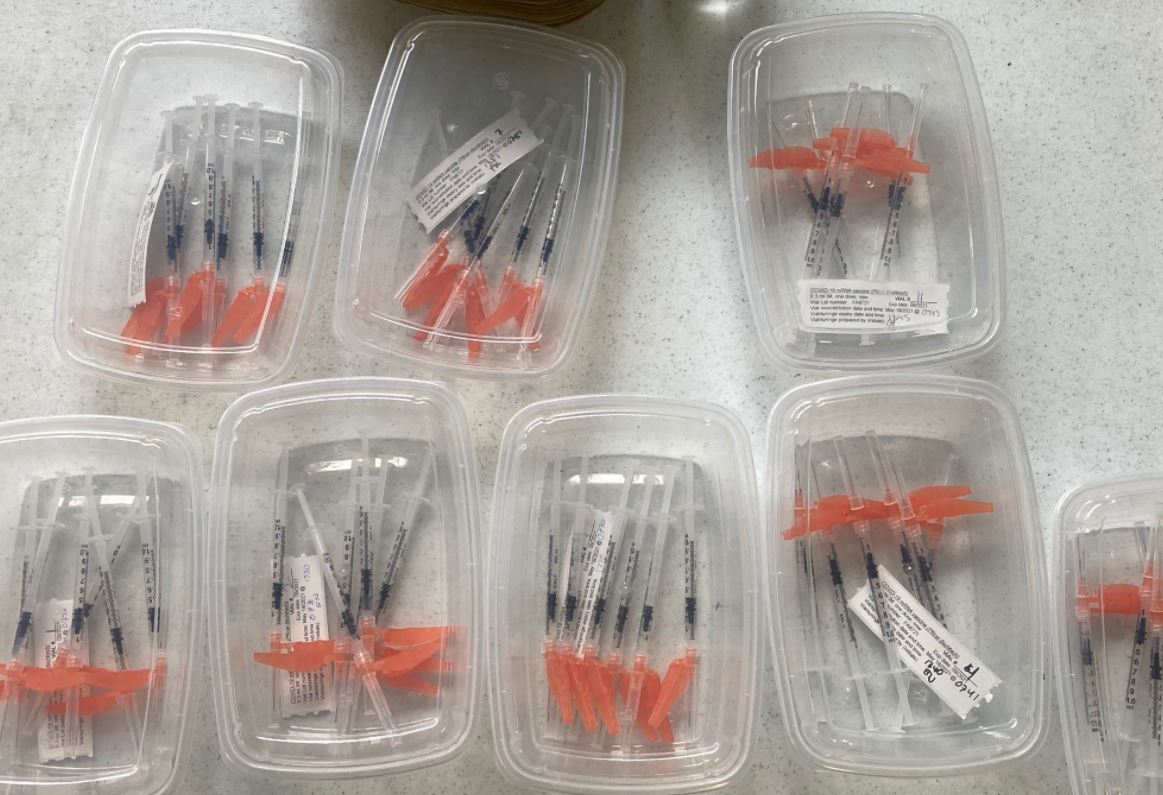
Christiane Coopman’s Thanksgiving plans don’t include an elaborate stuffed turkey dinner or the excited chatter of her grandchildren around the dining table.
Just like last year, Coopman’s Thanksgiving will be a subdued affair, with turkey sandwiches shared with her husband and a video call from the kids.
Coopman, a 73-year-old blood cancer patient in Chilliwack, B.C., and her husband who suffers from melanoma, both received booster doses of the COVID-19 vaccine two weeks ago. But their vulnerable health conditions still leave them wary of holiday get-togethers.
“For blood cancer patients, we don’t generate (much) protection after two doses, and now that I have a third dose, it’s possible I have 90 per cent protection, but it’s possible I have six per cent,” said Coopman, who was diagnosed with chronic lymphocytic leukemia eight years ago.
“If I get COVID, it would take one week and I’d be dead. Why would I risk that?”
RELATED: Ontario’s top doctor releases guidelines for Thanksgiving, Halloween
Coopman is one of many immunocompromised Canadians deciding to forego or modify their traditional Thanksgiving plans this weekend. Despite high vaccination rates across the country, the COVID-19 virus continues to circulate, causing anxiety among those most susceptible to it.
Dr. Deepali Kumar, a transplant infectious disease physician at University Health Network, said reluctance around hosting or attending holiday events is commonplace among her immunocompromised patients.
Kumar co-authored a study on booster doses in organ transplant recipients earlier this year, finding that while a third jab offers some patients more protection against COVID-19, it doesn’t work for all of them – and most will never know how shielded they are.
“I listen to this frustration every day, and all I can say is that we (researchers) are working on different ways of ensuring that anybody who’s immunocompromised is protected,” she said. “It’s possible we may never have the same level of protection in the immunocompromised that we do in the general population.
“The best way to make sure they’re protected is to get everybody vaccinated (to) reduce transmission of COVID in the community as much as we can.”
While Kumar noted it can be disappointing for immunocompromised individuals to feel held back as others move on to a more normal life, she said it’s possible to have safe Thanksgiving gatherings with some stipulations.
She suggested keeping the groups small and limited to only fully vaccinated guests. While kids under 12 are not yet eligible for vaccination, she said they can attend safely if parents stay vigilant about any COVID-19 cases in their schools leading up to the event.
Kumar said COVID-19 levels within the local community also matter. Immunocompromised people living in areas with few daily cases can take more liberties than those in provinces such as Alberta and Saskatchewan, which are mired in fourth waves.
Alberta’s chief medical officer Dr. Deena Hinshaw warned this week that indoor gatherings, including Thanksgiving dinners, are “still not permitted” for unvaccinated individuals. She urged even vaccinated families to celebrate outdoors instead.
New Brunswick, meanwhile, told its residents to stick to single-household gatherings, part of new restrictive measures aimed at halting the recent rise of cases in that province.
Ontario’s top doctor Kieran Moore said this week that while people attending fully vaccinated Thanksgiving dinners could remove their masks indoors if they were comfortable, he still recommended keeping groups with unvaccinated guests outdoors with face coverings on.
He suggested masks be worn at gatherings that involve people “vulnerable to this virus,” such as older guests and those with chronic medical conditions.
Tina Proulx, a double-lung transplant recipient in Ottawa is taking a “baby step” this Thanksgiving, venturing out to her sister’s house for dinner along with six of her relatives.
The holiday feast marks the first time since before the pandemic that Proulx will gather indoors with more than two family members at once, and the first time those relatives, who are fully vaccinated, haven’t been asked to quarantine for 14 days before her visit as an added precaution.
Proulx and her husband will eat and a separate table, at a comfortable distance but close enough to still feel part of the celebration, she said. Attendees will be masked when not eating, and Proulx’s brother, who has unvaccinated children, won’t be at the gathering.
The 38-year-old knows it sounds like a lot of precautions for a small family get-together, especially considering the risk of catching the virus from a fully vaccinated person is low. But her relatives understand the extra vigilance.
“They’ve seen everything I’ve gone through,” said Proulx, who was diagnosed with pulmonary hypertension a decade ago and received a new set of lungs in 2015.
“They certainly don’t want to put me at risk.”
Proulx received her third COVID-19 vaccine dose in August, saying it gave her a bit more confidence to visit family at Thanksgiving. But like Coopman, she doesn’t know how protected she is, and it’s been hard to calculate risk in everyday activities.
“I don’t know if (three doses) is enough and it’s really frustrating,” Proulx said. “When it comes to making a decision to go into a store, to have coffee with a friend, to have a family dinner, those are things I would love to do.
“But I’m still very hesitant.”
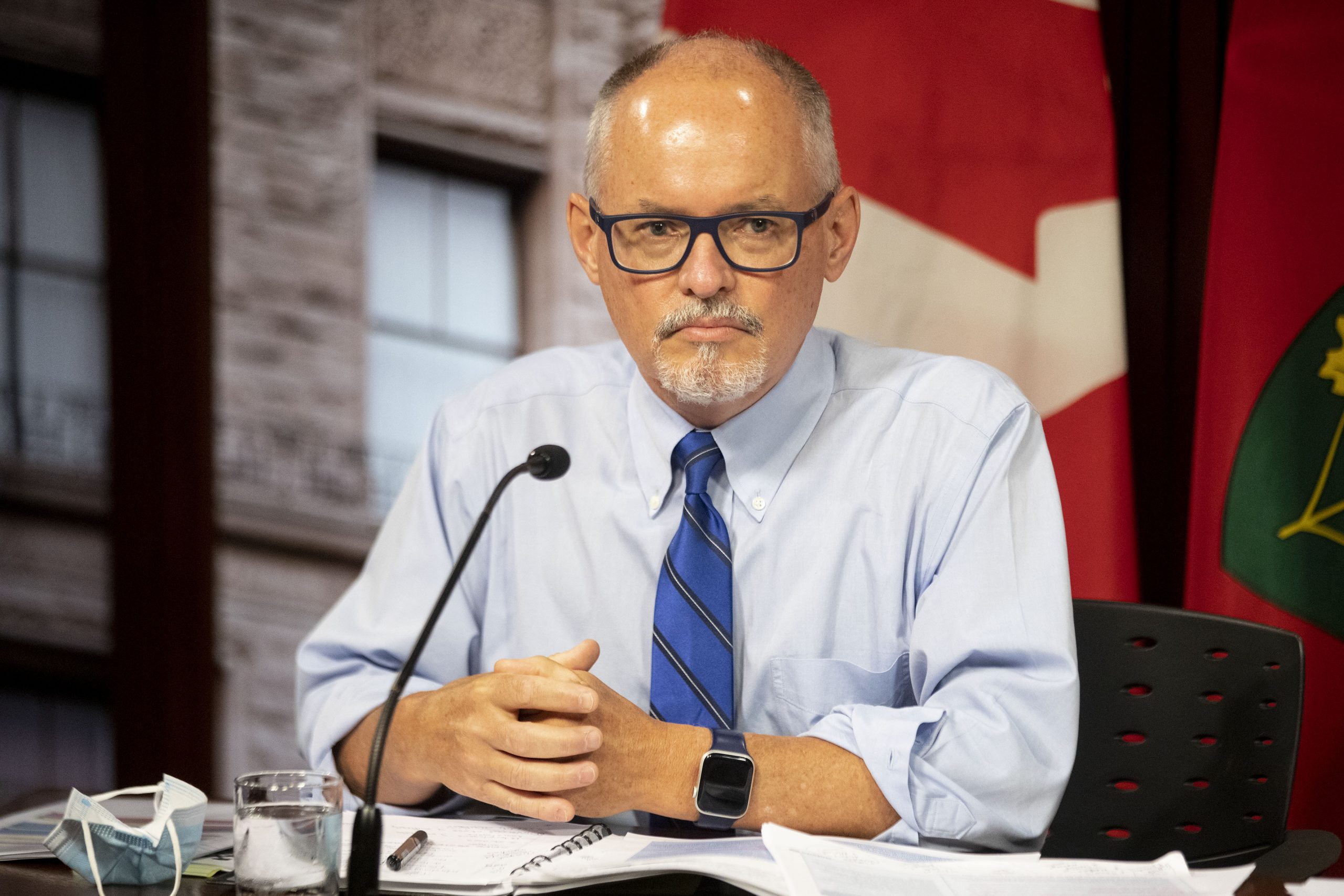
Summary
Dr. Kieran Moore says celebrating indoors and unmasked with a fully vaccinated group is “absolutely appropriate”
Ontario’s gathering limits of 100 outdoors and 25 indoors are still in place
Province’s average of daily new COVID-19 cases has generally been declining since early September
Ontario’s chief medical officer of health is set to release his advice Thursday for safely celebrating Thanksgiving and Halloween.
Earlier this week, Dr. Kieran Moore did touch on some of his recommendations for Thanksgiving, saying celebrating indoors and unmasked with a fully vaccinated group is “absolutely appropriate.”
Ontario’s gathering limits of 100 outdoors and 25 indoors are still in place.
Moore says if there is a combination of vaccinated and unvaccinated people in the group, attendees may consider keeping masks on indoors, particularly for older people or those with chronic medical conditions.
Last year, Ontario recommended that kids in the four COVID-19 hot spots at the time, which were Toronto, Ottawa, Peel and York regions, should not go trick-or-treating.
Ontario’s average of daily new COVID-19 cases — at 576 — has generally been declining since early September, while last year at this time it was a bit higher, but on the rise.
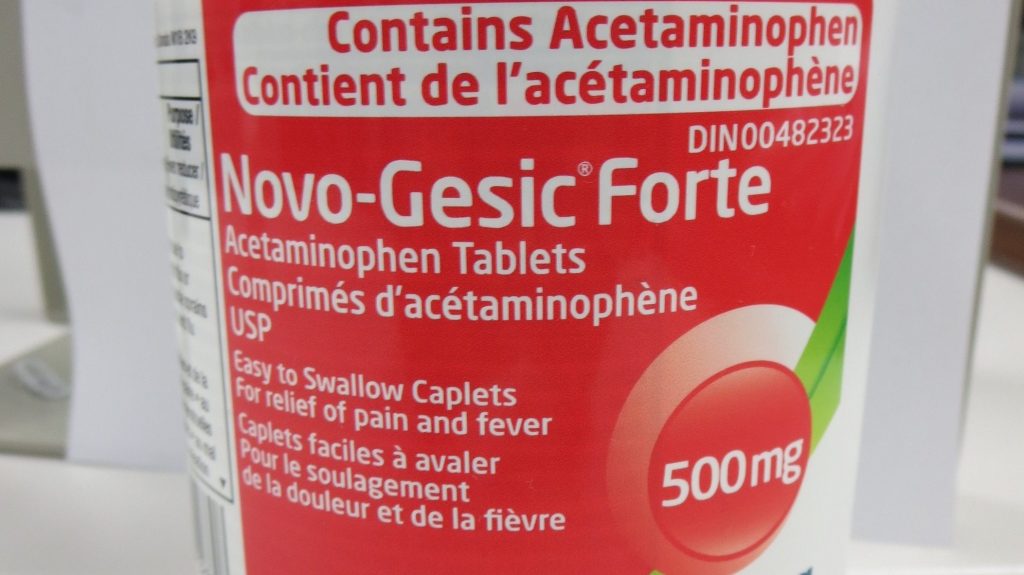
Summary
The 500mg tablets were sold in packages containing 1,000 and 100 caplets, and were distributed in Canada starting Aug. 3
Consumers who follow the incorrect directions could ingest doses of acetaminophen ranging 4,500-6,000 mg in 24 hours
To date, Teva Canada Limited has not received any reports of adverse events related to the lots being recalled
Health Canada has issued a recall for two lots of Novo-Gesic Forte Acetaminophen tablets distributed by Teva Canada because of a labelling error that could result in a person exceeding the maximum daily dosage for acetaminophen.
The 500 mg tablets were sold in packages containing 1,000 and 100 caplets, and were distributed in Canada starting Aug. 3, 2021. The affected bottles have an expiration date of June 2023, with the lot numbers 35364729A and 35217483A.
The label on the bottle of affected products incorrectly states “do not take more than 4,000 mg (12 tablets) in 24 hours.” However, the correct number of tablets should be eight.
Health Canada says consumers who follow the incorrect directions could ingest doses of acetaminophen ranging from 4,500 to 6,000 mg in 24 hours and experience symptoms of acetaminophen overdose.
Signs of acetaminophen overdose include nausea, vomiting, lethargy, sweating, loss of appetite and pain in the upper part of the abdomen or stomach. Abdominal pain may be the first sign of liver damage, which can result in liver failure or death.
To date, Teva Canada Limited has not received any reports of adverse events related to the lots being recalled.
Customers are being told to stop using the products, and to contact their local poison control centre or emergency health care services immediately if they think they have taken too much acetaminophen.









